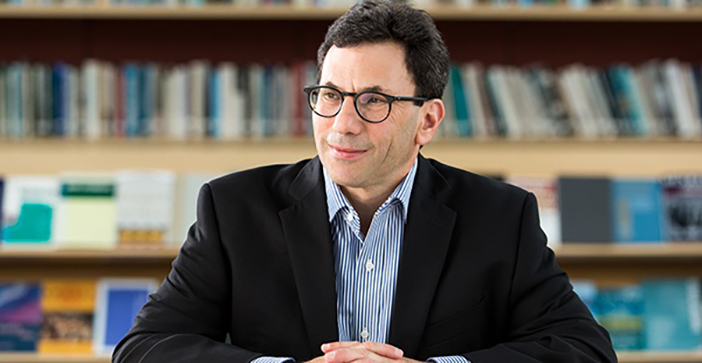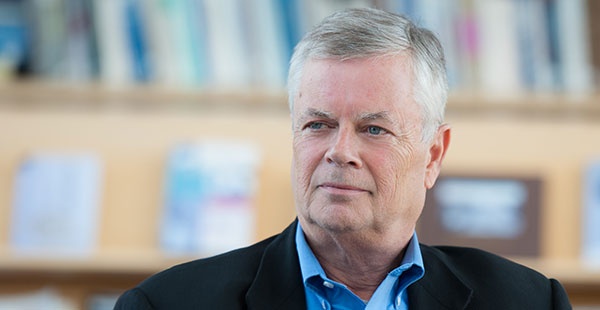PROVIDENCE, R.I. [Brown University] — Now that the long, contentious U.S. presidential election of 2016 has come to a close, faculty from the University’s Watson Institute for International and Public Affairs weighed in with their perspectives on important issues for President-elect Donald J. Trump — from how to boost economic prosperity and foster unity among a fractious electorate to strategies for promoting security through productive international relations, defining values pre-inauguration by participatory democracy and contending with climate change.

Eric Patashnik
Julis-Rabinowitz Professor of Public Policy; Professor of Political Science; Director, Public Policy Program:
Build Infrastructure
Donald Trump’s stunning victory is a threat to civil rights and civil liberties, to internationalism and world peace, and to progress on many issues. Obama’s accomplishments on health care, climate change, and financial reform are all at risk. If Trump uses the power of his office to bully opponents, trample Constitutional norms, and scapegoat groups, he should be resisted.
Trump’s top domestic priority should be to promote widely shared economic prosperity. While there is no magic bullet to generate broad-based, inclusive growth, it is hopeful that he recognizes (as did Clinton) that the United States would benefit from a boost in infrastructure investment. There is no shortage of attractive investment targets. Many roads, bridges, water systems, and airports are crumbling from deferred maintenance. Investments in public infrastructure can increase future productivity and generate jobs that often offer middle class wages to blue collar workers.
Infrastructure will present an early signal of how Trump will govern and whether he will use his presidency for constructive purposes rather than destructive ones.

Rose McDermott
David and Marianna Fisher University Professor of International Relations
Unity, or at Least Cooperation
I think in the wake of such a rancorous and divisive campaign, and such a close election, the new U.S. president’s main task must be to try to bring the country together. The tone of the campaign has been so hostile and negative on both sides that bridging the ideological gap in the country may prove more difficult than in the past. Effective democratic politics requires compromise, but hatred makes negotiation more difficult. Moving hatred and fear toward compromise and cooperation is not a trivial task, and may indeed be impossible, but the effort remains essential nonetheless. Striving for some sense of unity is not just important for achieving better prospects for effective governance. It also constitutes a strategy of enlightened self-interest because a divided population will make all political debates more contentious.
The challenge, of course, as always, is that victors are rarely willing to give concessions to losers, even when they win by the narrowest of margins. And those who are left excluded and alienated from the political process may work to obstruct the changes the victor may wish to institute.

James Green
Carlos Manuel de Céspedes Professor of Latin American History
Anything Goes
As we have now learned, it is quite hard to predict U.S. presidential politics these days. Suggesting the immediate agenda of the president-elect seems a rather futile task, as nothing is likely to be as one might imagine. Whether he can reassure the world that he will not take the United States to the brink of a world war is anyone’s guess. Whether he can now contain the hatred and racism that he has unleashed is equally questionable. Whether he can fulfill any of the economic promises that he has peddled seems as likely as the ability to make a million dollars after going to his university. The politics of resentment and anger won the elections. It will only strengthen similar tendencies worldwide.

Stephen Kinzer
Senior Fellow in International and Public Affairs
It’s About Mexico
Our new president has said he wants to reduce tension between the United States and Russia, which is good. With luck, he will also come to understand that just as Russia poses no threat to us, neither do Iran, Syria, Afghanistan or other countries where we are involved in nation-building or nation-destroying. There is one country, however, that is hugely important to the United States and that Donald Trump has deeply alienated: Mexico. Repairing this tie should be his first foreign policy priority.
With the possible exception of China, Mexico is the most important country in the world to us. Our fates are inextricably tied. We rise or fall together. A thriving Mexico immeasurably strengthens the national security of the United States. A failing Mexico, or one that degenerates into instability, or one that chooses a leader who wants to confront the United States, threatens our security. In fact, that is just about the only true security threat on our geopolitical horizon. It is still distant, because in many ways Mexico is thriving and highly promising. Yet Trump’s campaign rhetoric has outraged many Mexicans. He should move quickly to heal this wound.

Jayanti Owens
Assistant Professor of International and Public Affairs and Sociology
It’s Our First 100 Days
Yesterday's election was testament to the fact that our country is more deeply divided than many of us thought possible. These divides call into question our fundamental commitment to democracy, as witnessed by the Senate block on the confirmation of Judge Garland to the Supreme Court. Our country's divides also question our ideals of opportunity, as witnessed by popular support of Mr. Trump's plans to expunge many of our country's immigrants and to dismantle the Affordable Care Act. The huge amount of uncertainty that this election raises is already carrying severe consequences for the global economy, with implications for the well being of Americans and that of people around the globe.
What matters most right now is not what Mr. Trump does in his first 100 days, but what we as Americans do in our next 100. What matters is what beliefs and commitments we take a stand for at this moment -- and insist that our elected officials uphold as well. This must involve upholding the democratic process with regard to the Supreme Court, the Affordable Care Act, our treatment of all people contributing to our country's economy, our commitment to gender equality, and the way we treat our environment. We must insist on concrete plans for moving forward the kind of democracy we believe in, rather than being paralyzed by threats about what will be torn down. We must also keep focus on what's happening directly around us -- in our communities and our states -- and recognize that we have agency at these levels, too, and the time to take action is now.

Mark Blyth
Eastman Professor of Political Economy, Professor of Political Science and International and Public Affairs
The first 100 days are not going to be about what they should be about, regardless of who gets elected today…
Trump versus Clinton. The brash outsider (or the sexist, racist, reality star, if you prefer) versus the experienced policymaker (or criminal, Wall-Street-loving one percenter, if you prefer). Now we know what happened, what happens next? The list of what they should try to do during the first 100 days is endless. Infrastructure, entitlement reform, tax reform, bipartisan bridge building, calm the markets … take your pick. But here’s what neither of them is going to do anything about, and it is pretty much the only thing that matters in the long run.
I originally wrote this at my desk in the Watson Institute on November 8, 2016. The average temperature in Providence, Rhode Island, in November is 51.5 degrees F. The average high temperature is 53 degrees F. Yesterday it was 62 degrees. A week ago it was 71 and 70 degrees F on successive days. Just in case you think this is a blip, a local anomaly, please consider that the arctic as a whole is five degrees above trend.
The new leader of the United States thinks that global warming is either a joke or a hoax perpetuated by the Chinese government. His entire party, now dominant in the Senate and the House, refuses to acknowledge this reality and wants to dig more coal and burn more oil. And it’s not that Clinton would have done much better. The ‘nudges’ and incremental gains so beloved by mainstream democrats don’t really count for much on this front.
So let’s talk tax cuts, trade agreements, tort reform, and anything else you like. But just remember: Nature bats last. And Nature is coming to home plate quicker than ever.